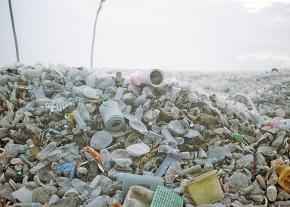The earth is choking on plastic
Plastics are everywhere in the global economy because of corporate priorities, not consumers, writes in an article for the Australian website Red Flag.
EVERY YEAR, enough plastic is produced to match the entire weight of humans on earth. A large portion of this, between 5 and 13 million tons, ends up in the ocean. Researchers at the Ellen MacArthur Foundation estimate that by 2050, the ocean will contain more plastic, by weight, than fish.
The scale of the problem is such that some environmentalists regard it as rivaling climate change. Plastic waste isn't just a blight on the landscape. It is disrupting the natural systems on which our very existence depends.
One example is plastic entering the food chain. Much of the plastic in the ocean is ground into tiny fragments. These fragments are eaten by fish, which are then eaten by us. A study by researchers in Belgium found that regular eaters of seafood consume as many as 11,000 plastic fragments a year. Unfortunately, there are no known health benefits.
Perhaps the biggest single contributor to plastic pollution is the global drinks industry. Around 16,000 plastic bottles are produced every second. In 2016, more than 480 billion plastic bottles were sold around the world, and the number is increasing rapidly. Coca-Cola alone makes 100 billion bottled drinks a year.

The ubiquity of plastics in the global economy is the product of choices made by global corporations, not consumers.
In the early part of the 20th century, it was the norm for drinks to be sold in glass bottles that were designed for reuse. Included in the price of drinks like Coke was a small deposit, which was refunded to customers when the bottle was returned.
This all changed in the decades following the Second World War, when the global drinks market became increasingly dominated by major corporations. Companies like Coca-Cola wanted to use their market dominance to create "economies of scale." One way they cut costs was by introducing disposable plastic bottles that didn't need to be returned and reused.
As the use of these bottles grew through the 1950s and 1960s, many governments sought to limit waste by imposing deposit refund schemes similar to those the companies themselves had implemented for glass bottles. But Coca-Cola and others fought hard against them, arguing that the schemes would reduce sales and that waste could be better dealt with by recycling.
Fifty years later, the battle is still being fought. Recycling isn't the panacea that Coca-Cola and others argued it would be. In the U.S., for example, only 30 percent of plastic containers end up being recycled, and the figure is similar in Australia. The rest is incinerated or ends up in landfill or in waterways and oceans.
According to Greenpeace, the world's six biggest beverage companies use, on average, just 6.6 percent of recycled plastic in their products. Their justification for not increasing the proportion is that the bottles would be less "aesthetically pleasing" to consumers. The reality is that it is often cheaper to produce new plastic than it is to purchase it from recycling companies.
RECOGNIZING THE failure of existing recycling programs, governments in Australia and elsewhere are again looking to impose deposit refund schemes. And, again, these measures are being fiercely opposed by the drinks industry.
When the Northern Territory introduced a refund scheme in 2011, Coca-Cola sued it in court. And it has subsequently lobbied hard against the New South Wales (NSW) and Queensland governments, which are set to introduce their own schemes.
A 2015 report by Coca-Cola to the U.S. Securities and Exchange Commission makes it clear what its opposition is about: "If these requirements [deposit refund schemes] are implemented on a large scale in any of the major markets in which we operate, they could affect our costs, which could reduce our profitability."
It doesn't have to be this way. There's no reason why we couldn't revert to a system in which all bottles and other containers were routinely returned for reuse. Not only would this help save the environment, it would also create significant numbers of jobs.
The reason it doesn't happen is simple. Global corporations are happy to profit from existing arrangements in which they can produce their products on the cheap and "externalize" the costs of dealing with plastic waste onto society.
A plastic bottle takes around 450 years to degrade. For the sake of humanity, and the natural environment on which we depend, we can only hope capitalism has a more proximate expiration date.
First published at Red Flag.


